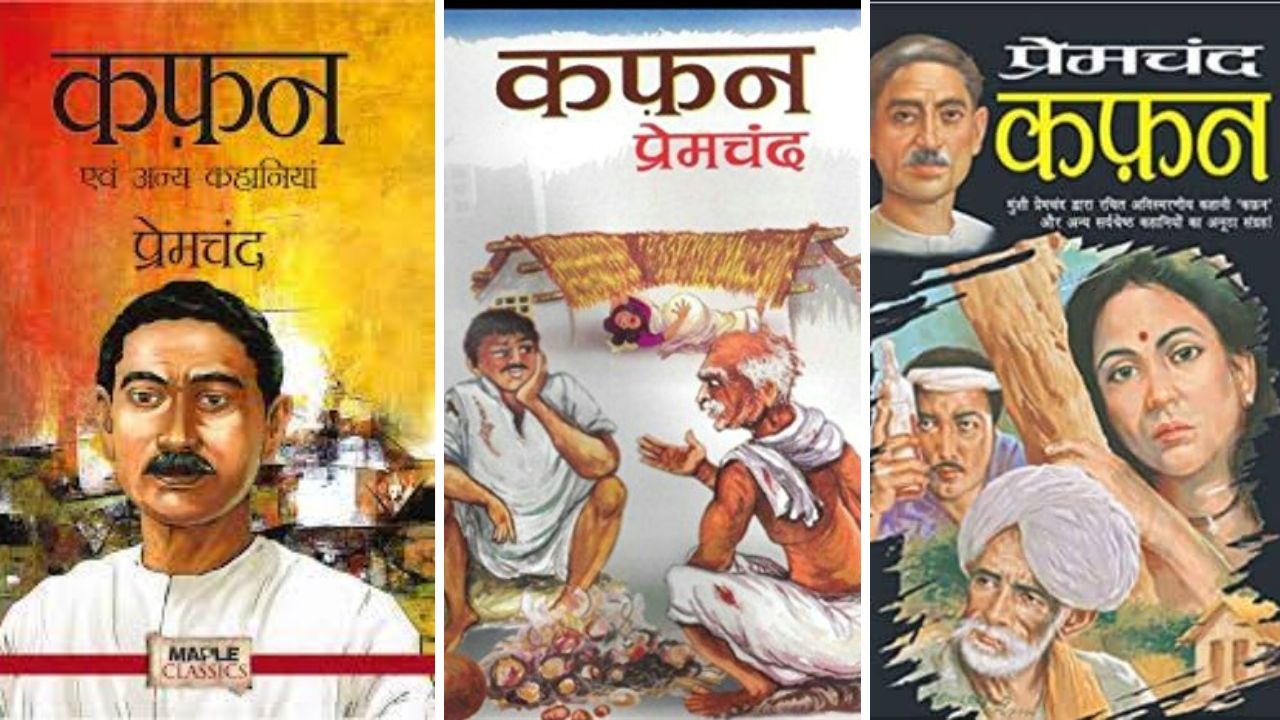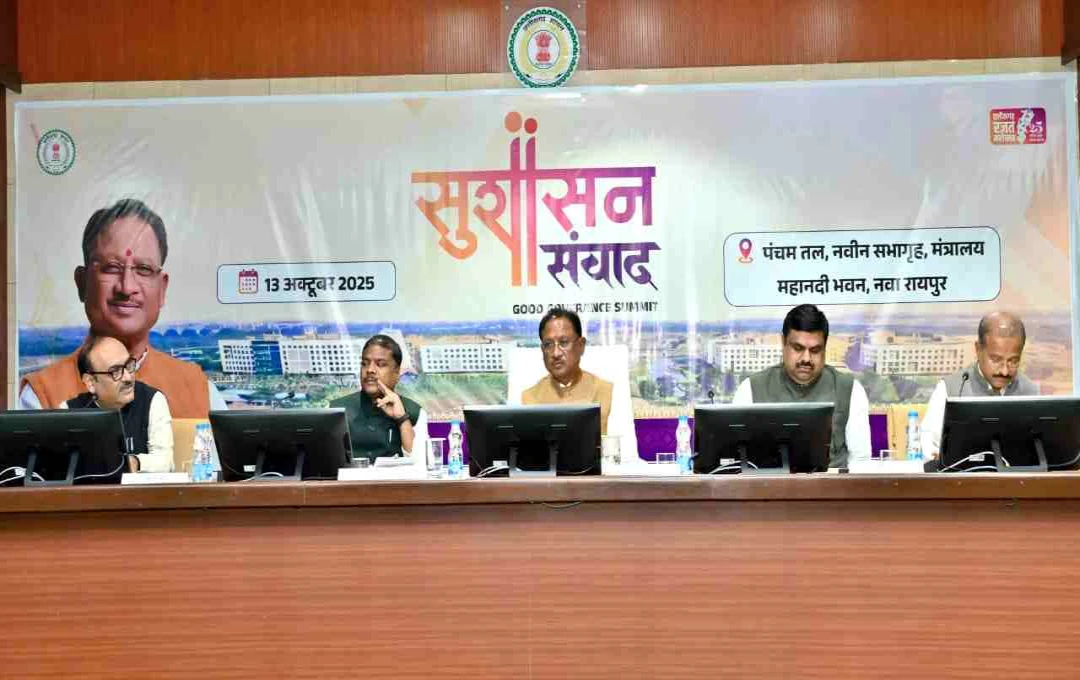Friends, our country has for centuries been the birthplace and abode of great personalities brimming with virtues – sages, poets, writers, musicians, and many more. The thousands of creations composed by these luminaries are invaluable.
Today's youth, in this digital age, seem to be lost, drifting further and further from our heritage and priceless treasure. subkuz.com strives to bring you these invaluable treasures along with entertaining stories, news, and information from India and around the world.
Presented here is one such invaluable story by Munshi Premchand.
*The Shroud (Kafan)
At the entrance of their hut, father and son sat silently before a dying ember. Inside, the son's young wife, Budhia, writhed in labor. Her cries were so heart-wrenching that both men clutched their chests. It was a cold winter night; nature was shrouded in silence, the entire village lost in darkness.
Gheesu said, "It seems she won't survive. We've been running around all day. Go and see."
Madhav retorted irritably, "If she's going to die, why doesn't she just die quickly? What good will looking do?"
"You're so heartless! You lived comfortably with her for a whole year, and now this disloyalty!"
"I just can't bear to watch her thrashing and writhing."
They were a family of Chamars, infamous throughout the village. Gheesu worked one day and rested for three. Madhav was such a shirker that he would work for half an hour and then smoke a hookah for an hour. Therefore, they rarely found work. If they had even a handful of grain at home, working was a curse for them. When hunger struck, Gheesu would climb a tree to gather wood, and Madhav would sell it in the market. As long as the money lasted, they idled. When hunger returned, they would gather wood or seek work. There was no shortage of work in the village. It was a village of farmers; fifty jobs existed for a hardworking man. But these two were only called upon when no other choice remained, even if one man could do the work of two.
If they had been ascetics, they wouldn't have needed contentment, patience, restraint, or discipline. This was simply their nature. Their life was peculiar! They possessed nothing but a few earthen pots at home. They covered their nakedness with tattered rags, free from worldly worries, yet burdened by debt. They received insults and beatings, yet felt no sorrow. They were so destitute that people still lent them something, even without hope of recovery. They would pilfer peas or potatoes from others' fields, roast and eat them, or steal sugarcane stalks and suck on them at night. Gheesu had lived for sixty years through this opportunistic lifestyle, and Madhav, like a dutiful son, followed in his father's footsteps, indeed surpassing him. Even now, they sat by the fire roasting potatoes pilfered from someone's field. Gheesu's wife had passed away long ago. Madhav had married last year. Since this woman arrived, she had established a semblance of order in their household, constantly scolding these two scoundrels. Since her arrival, they had become even lazier, even somewhat arrogant. If someone called them for work, they demanded double wages without a second thought.
Now, this woman was dying in labor, and these two were perhaps waiting for her death so they could sleep peacefully.
Gheesu peeled the potatoes, saying, "Go and see what her condition is. It'll be some witch's mischief, what else? Even a sorcerer demands a rupee!" Madhav feared that if he went to the room, Gheesu would eat the larger share of the potatoes. He said, "I'm scared to go there."
"What's there to be scared of? I'm right here."
"Then you go and see."
"When my wife was dying, I didn't move from her side for three days. And I'll be ashamed to see her? I've never seen her face; now I'll see her exposed body! Won't she even care about her body? If she sees me, she won't be able to thrash and writhe freely!"
"I'm thinking, what will happen if there's a child? We don't have ginger, turmeric, or oil at home!"
"Everything will come if God wills it! Those who aren't paying us now will call us tomorrow and give us money. I've had nine sons; we never had anything at home, but God always somehow got us through."
In a society where those who toiled day and night were not much better off, and those who exploited the weaknesses of the farmers were far wealthier, such a mindset was not surprising. We would say Gheesu was far more thoughtful than the farmers, preferring the corrupt group of idlers to the mindless group of farmers. However, he lacked the discipline to follow their rules. Therefore, while others in his group became village leaders and headmen, the entire village pointed fingers at him. Yet, he found solace in the fact that even if he was impoverished, he didn't have to toil like the farmers, and his simple nature didn't allow others to take unfair advantage of him.
They continued to eat the burning potatoes. They hadn't eaten anything since yesterday. They were too impatient to let them cool. Several times, both their tongues burned. Once peeled, the outer layer of the potato didn't seem very hot; but the moment it touched the teeth, the inside burned the tongue, throat, and palate. It was better to get it down quickly. They gulped it down hastily, tears streaming from their eyes.
Gheesu remembered the Thakur's wedding feast he had attended twenty years ago. The satisfaction he experienced then was a memorable event in his life, still fresh in his memory. He said, "I'll never forget that feast. I haven't eaten such a filling meal since. The bride's family fed everyone their fill of puris, everyone! Young and old, everyone ate puris, and real ghee puris at that! Chutney, raita, three kinds of dry vegetables, one juicy vegetable, yogurt, chutney, raita...what else can I say? What a feast! There were no restrictions; whatever you wanted, ask for it, eat as much as you want. People ate so much that no one even drank water. The servers kept placing hot, round, fragrant kachoris on the plates. We’d say we didn’t want any more, holding our hands over the plates, but they kept giving us more. After everyone had washed their mouths, we got paan and elaichi. But where was the time for me to take paan? I couldn't even stand up! I just went and lay down on my blanket. That Thakur was so generous!"
Madhav, relishing the memory, said, "No one feeds us like that anymore."
"Who would? Those were different times. Now everyone is frugal. Don't spend on weddings, don't spend on funerals. They ask, where will you keep all the wealth you hoard from the poor? There's no shortage of hoarding, yes, but thrift is the order of the day!"
"You must have eaten twenty puris?"
"More than twenty!"
"I would've eaten fifty!"
"I ate at least fifty. It was a great feast. You're only half the man I am."
After eating the potatoes, they drank water and, wrapping their dhotis around themselves, lay down by the fire with their legs tucked in their stomachs. Like two large pythons coiled up, while Budhia continued to moan.
In the morning, Madhav went to the room and saw that his wife was dead. Flies buzzed around her face. Her eyes were fixed upward. Her body was covered in dust. The child in her womb was dead. Madhav ran to Gheesu. Then both wailed loudly and beat their chests. The neighbors heard the cries and rushed over, according to old customs trying to console these unfortunate ones. But there was no time for excessive mourning. They needed to worry about the shroud and the wood. But money was as scarce in their home as meat in an eagle's nest. Father and son, weeping, went to the village landlord. He hated them; he had beaten them many times for stealing and for not showing up for work when promised. "What is it, Gheesua? Why are you crying? You don't even show your face around here! It seems you don't want to live in this village." Gheesu, placing his head on the ground with tears in his eyes, said, "Sir! I am in great distress. Madhav's wife passed away last night. She thrashed all night, sir! We both sat by her bedside. We did everything we could, but she betrayed us. Now there's no one left to feed us, master! We're ruined. The house is empty. I'm your servant. Now who else will handle her last rites? Whose door should I go to except yours?" The landlord was kind-hearted, but showing kindness to Gheesu was like painting on a black blanket. He wanted to say “Go away from here!” He never came when called, only when needed. A scoundrel, a rogue! But this wasn't the time for anger or punishment. Grumbling inside, he pulled out two rupees and threw them down. He didn't utter a word of consolation, nor did he even look at him. It was as if he had lifted a weight off his shoulders.
Once the landlord gave two rupees, how could the village shopkeepers and moneylenders refuse? Gheesu knew how to use the landlord's name to his advantage. Some gave two annas, some four. Within an hour, Gheesu had collected a good five rupees. He obtained grain from somewhere, wood from somewhere else. In the afternoon, Gheesu and Madhav went to the market to buy a shroud. Meanwhile, people started cutting bamboo. The kind-hearted women of the village came to see the body and shed a few tears at her plight. What a cruel custom, that he who in life could not find a rag to cover himself should need a shroud in death. The shroud burns with the body! What remains? If they had gotten these five rupees earlier, they could have bought some medicine. Both pondered this. They wandered around the market, visiting one shopkeeper's stall after another. They looked at various cloths, silk and cotton, but nothing appealed to them. Evening approached. Then, as if by divine inspiration, they found themselves in front of a tavern and, as if following a pre-arranged plan, went inside. For a while, both stood there, hesitant. Then Gheesu went to the counter and said, "Sir, give us a bottle too." Then some snacks arrived, fried fish, and both sat on the veranda and calmly began to drink.
After several pegs, both became intoxicated. Gheesu said, "What's the point of a shroud? In the end, it just burns; nothing goes with the woman." Madhav, looking towards the sky, as if bearing witness to his innocence to the gods, said, "It's the custom of the world. Why do people give Brahmins thousands of rupees? No one knows if you get anything in the afterlife or not! Wealthy people have money to spare. What do we have to spare? But what will you tell people? People will ask, where’s the shroud?" Gheesu laughed, "We’ll say the money slipped out of our pockets. We searched everywhere but couldn't find it." People won’t believe us, but they'll give us the money anyway." Madhav laughed at this unexpected good fortune and said, "She was a good woman! She fed and watered us even in death! She drank more than this bottle." Gheesu ordered two seers of puris. Chutney, pickles, and livers. There was a shop right in front of the tavern. Madhav quickly brought all the food in two plates. Another rupee and a half was spent. Only a few paise remained. Now they were sitting proudly, eating puris, like a lion enjoying its prey in the jungle. They felt no fear of accountability or shame. They had conquered these feelings long ago. Gheesu said philosophically, "Our souls are happy; won't that be a good deed?" Madhav nodded in agreement, "Certainly, certainly. God, you are all-knowing. Take her to Vaikunth. We both bless her from our hearts. We never had a meal like this in our whole lives." A moment later, a doubt arose in Madhav's mind. He said, "Grandpa, we'll also go there one day." Gheesu didn't answer this naive question. He didn't want to disrupt this joy by thinking about the afterlife. "What will we say if they ask us why we didn't give her a shroud? We'll say, 'It's your responsibility!' She will certainly ask! Do you think she won't get a shroud? Do you take me for a fool? Have I spent sixty years digging in the earth? She will get a shroud, and a much better one than this." Madhav didn't believe him. He said, "Who will give it? You spent the money. She’ll ask me. I put the sindoor in her parting." Gheesu said hotly, "I tell you, she will get a shroud!"
"Why don't you believe me? Who will give it, why won't you tell me? The same people who gave it this time. Yes, this time the money won't come into our hands." As darkness deepened and the stars shone brighter, the tavern buzzed with activity. Some sang, some boasted, some embraced their companions. Someone would take a drink from their friend's kulhad. The atmosphere was intoxicating; the air was heady with intoxication. So many became intoxicated with just a small drink. The air of the place intoxicated them more than the alcohol. The burdens of life were lifted, and for a while, they forgot whether they were living or dying! Or, neither living nor dying. And these two, father and son, were still happily sipping their drinks. Everyone's eyes were on them. How fortunate they were! The entire bottle was between them. After eating their fill, Madhav picked up the remaining puris and gave the plate to a beggar who had been standing there watching them with hungry eyes. And he felt the pride, joy, and ecstasy of giving for the first time in his life. Gheesu said, "Take it, eat well, and bless her! The one who earned it is gone. But your blessings will surely reach her."
“Bless her with all your heart; it’s money from a great earning!” Madhav looked towards the sky and said, "She'll go to Vaikunth, Grandpa; she'll become the queen of Vaikunth." Gheesu stood up, as if floating on waves of joy, and said, "Yes, son, she'll go to Vaikunth. She didn't torment anyone, didn't oppress anyone. Dying, she fulfilled the greatest desire of our lives. If she doesn't go to Vaikunth, will those fat cats go, who loot the poor with both hands and bathe in the Ganges to wash away their sins and offer water in temples?" This devoutness instantly changed. Instability is a characteristic of intoxication. A wave of sorrow and despair struck. Madhav said, "But Grandpa, the poor thing suffered so much in her life. How much sorrow she endured before dying!" He covered his eyes and began to cry, wailing loudly. Gheesu consoled him, "Why are you crying, son? Be happy that she's free from the web of illusion. She's escaped the snare. She was so fortunate to break the bonds of attachment so quickly." And both stood up and began to sing – “Why does the sly woman wink her eyes?” Then both began to dance. They jumped, leaped, fell, and swayed. They made expressions and acted, and finally, overcome with intoxication, collapsed where they stood.
Keep reading such inspiring and insightful stories on subkuz.com.





